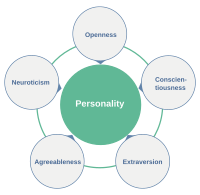
Photo from wikipedia
Personality is the description of an individual’s tendencies when acting or reacting to others. Clinicians spontaneously form impressions of a patient’s apparent personality yet such unstructured impressions might lead to… Click to show full abstract
Personality is the description of an individual’s tendencies when acting or reacting to others. Clinicians spontaneously form impressions of a patient’s apparent personality yet such unstructured impressions might lead to snap judgments or unhelpful labels. Here we review the evidence-based five-factor model from psychology science for understanding personalities (OCEAN taxonomy). Openness to experience is defined as the general appreciation for a variety of experiences. Conscientiousness is the tendency to exhibit self-discipline. Extraversion is the degree of engagement with the external world. Agreeableness is the general concern for social harmony. Neuroticism is the tendency to experience negative emotions. An awareness of these five dimensions might help clinicians avoid faulty judgments from casual contact. Expert assessment of personality requires extensive training and data, thereby suggesting that clinicians should take a humble view of their own unsophisticated impressions of a patient’s personality.
Journal Title: Journal of General Internal Medicine
Year Published: 2021
Link to full text (if available)
Share on Social Media: Sign Up to like & get
recommendations!